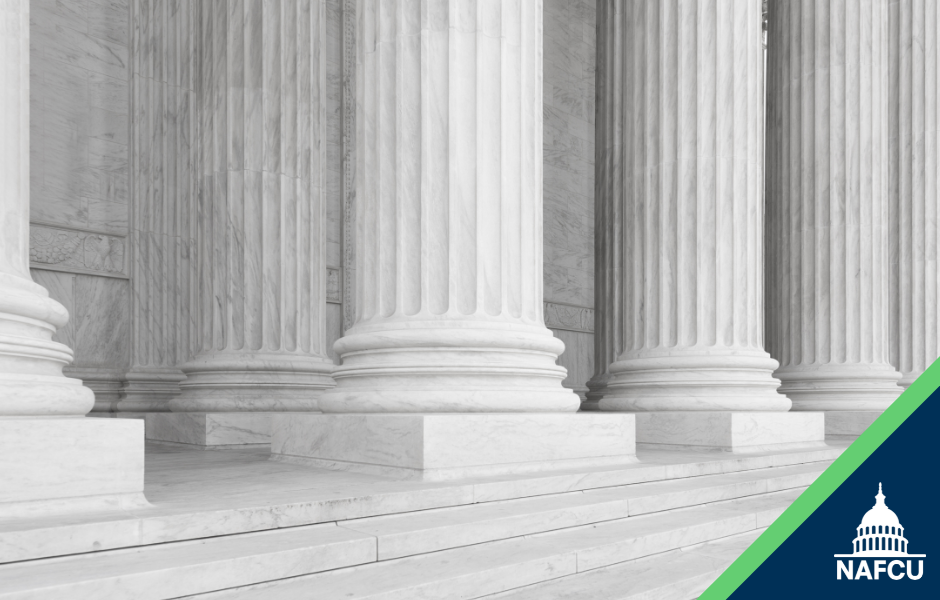Newsroom
EPA agrees with NAFCU: CUs eligible to receive GHGR Fund monies
 Following months of NAFCU advocacy to secure credit unions’ ability to receive money from the Greenhouse Gas Reduction (GHGR) Fund, the Environmental Protection Agency (EPA) agreed with the association’s position and declined to solely disburse funds through a green national bank.
Following months of NAFCU advocacy to secure credit unions’ ability to receive money from the Greenhouse Gas Reduction (GHGR) Fund, the Environmental Protection Agency (EPA) agreed with the association’s position and declined to solely disburse funds through a green national bank.
“NAFCU is pleased that the Environmental Protection Agency rejected the idea of a single, national green bank in favor of a multi-recipient model to ensure credit unions and community development financial institutions (CDFIs) are able to assist in fulfilling the core objectives of the Greenhouse Gas Reduction Fund,” said NAFCU Vice President of Regulatory Affairs Ann Petros.
“NAFCU has been a leading advocate for a commonsense interpretation of the text of the Inflation Reduction Act to establish an efficient and effective framework that will leverage the strengths of experienced community-based lenders, especially those in low-income and disadvantaged communities, and swiftly and more pragmatically deploy monies from the Fund to reduce greenhouse gas emissions and other air pollutants.”
The GHGR Fund was established under the Inflation Reduction Act of 2022 to provide grants for zero-emission technologies, and financial and technical assistance for projects to reduce greenhouse gas emissions and other air pollution.
The EPA Tuesday announced it will disburse funds through two federal assistance listings: $7 billion for a zero-emissions program for state, local and native governments; and $20 billion for an accelerator program for eligible non-profits, which includes credit unions and CDFIs. The agency anticipates making up to a total of 75 awards, with a breakdown of up to 60 awards to state and local governments and between 2-15 awards under the accelerator.
NAFCU called on the EPA to allow credit unions to obtain funds through the GHGR Fund to support projects that reduce greenhouse gas emissions and air pollution in low-income and disadvantaged communities. In response to inaccurate and misleading comments regarding the EPA’s ability to distribute money from the fund to credit unions, Petros countered with a legal analysis that indicated otherwise.
NAFCU will continue to work with the EPA and Congress to ensure appropriate implementation of the fund and credit unions’ access to it for qualified projects.
Share This
Related Resources
Add to Calendar 2024-06-26 14:00:00 2024-06-26 14:00:00 Gallagher Executive Compensation and Benefits Survey About the Webinar The webinar will share trends in executive pay increases, annual bonuses, and nonqualified benefit plans. Learn how to use the data charts as well as make this data actionable in order to improve your retention strategy. You’ll hear directly from the survey project manager on how to maximize the data points to gain a competitive edge in the market. Key findings on: Total compensation by asset size Nonqualified benefit plans Bonus targets and metrics Prerequisites Demographics Board expenses Watch On-Demand Web NAFCU digital@nafcu.org America/New_York public
Gallagher Executive Compensation and Benefits Survey
preferred partner
Gallagher
Webinar
Add to Calendar 2024-06-21 09:00:00 2024-06-21 09:00:00 The Evolving Role of the CISO in Credit Unions Listen On: Key Takeaways: [01:30] Being able to properly implement risk management decisions, especially in the cyber age we live in, is incredibly important so CISOs have a lot of challenges here. [02:27] Having a leader who can really communicate cyber risks and understand how ready that institution is to deal with cyber events is incredibly important. [05:36] We need to be talking about risk openly. We need to be documenting and really understanding what remediating risk looks like and how you do that strategically. [16:38] Governance, risk, compliance, and adherence to regulatory controls are all being looked at much more closely. You are also seeing other technology that is coming into the fold directly responsible for helping CISOs navigate those waters. [18:28] The reaction from the governing bodies is directly related to the needs of the position. They’re trying to help make sure that we are positioned in a way that gets us the most possibility of success, maturing our postures and protecting the institutions. Web NAFCU digital@nafcu.org America/New_York public
The Evolving Role of the CISO in Credit Unions
preferred partner
DefenseStorm
Podcast
AI in Action: Redefining Disaster Preparedness and Financial Security
Strategy
preferred partner
Allied Solutions
Blog Post
Get daily updates.
Subscribe to NAFCU today.
